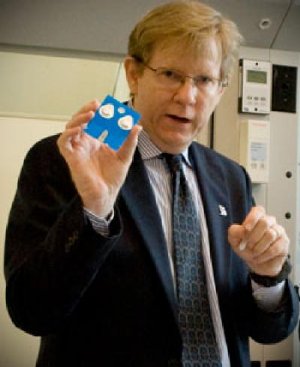Nov 5 2009
The National Institutes of Health (NIH) has awarded researchers in Rice University's new BioScience Research Collaborative (BRC) a $2 million Grand Opportunity (GO) grant to develop a fast, inexpensive test for oral cancer that a dentist could perform simply by using a brush to collect a small sample of cells from a patient's mouth.
 John McDevitt holds the prototype lab-on-a-chip card. Credit: Jeff Fitlow/Rice University
John McDevitt holds the prototype lab-on-a-chip card. Credit: Jeff Fitlow/Rice University
"We want to provide an accurate diagnosis for oral cancer in less than 30 minutes using a minimally invasive test that requires no scalpels or off-site lab tests," said principal investigator John McDevitt, Rice's Brown-Wiess Professor in Bioengineering and Chemistry. "The payoff for this could be tremendous because oral cancers today are typically diagnosed much too late in their development."
NIH established the GO grant program to support projects that address large, specific research endeavors that are likely to deliver near-term growth and investment in biomedical research and development, public health and health care delivery. GO grant funding was provided by the American Recovery and Reinvestment Act.
If oral cancer is detected early, the prognosis for patients is excellent, with a five-year survival rate of more than 90 percent. Unfortunately, the actual five-year survival rate for oral squamous cell carcinoma is only about 50 percent, among the lowest rates for all major cancers. Oral squamous cell carcinoma affects about 300,000 people per year worldwide, and most cases are diagnosed in their late stages.
The new test is possible because of a novel microchip invented in McDevitt's lab. This "lab-on-a-chip" uses the latest techniques in microchip design, nanotechnology, microfluidics, image analysis, pattern recognition and biotechnology to shrink many of the main functions of a state-of-the-art clinical pathology laboratory onto a microchip the size of a postage stamp.
The microchips are mounted on disposable, plastic cards that are slotted into a battery-powered analyzer. A brush-biopsy sample is placed on the card and microfluidic circuits wash cells from the sample into a reaction chamber. The cells pass through mini-fluidic channels about the size of small veins and come in contact with "biomarkers" that react only with specific types of diseased cells. The machine uses two LEDs, or light-emitting diodes, to light up various regions of the cells and cell compartments. Healthy and diseased cells can be distinguished from one another by the way they glow in response to the LEDs.
The oral-cancer test will be developed in collaboration with scientists at the University of Texas M.D. Anderson Cancer Center, the University of Texas Health Science Center at Houston, the University of Texas Health Science Center at San Antonio and the University of Sheffield in the United Kingdom. In addition to cancer, McDevitt's lab is developing tests for heart attacks and HIV, and it is developing a process to produce the disposable cards for pennies apiece.
"An affordable oral-cancer test that can be performed painlessly and quickly in either a regular visit at the doctor or dentist's office benefits patients and clinicians by detecting cancer earlier and lowering health care costs," McDevitt said.
The analyzers used in the test are made by Austin-based startup LabNow, a company McDevitt launched while at the University of Texas at Austin. McDevitt moved his lab from UT-Austin to Rice in July 2009 to be in the BRC, a state-of-the-art research facility that's within walking distance of the major research institutions of the Texas Medical Center (TMC). McDevitt's lab is slated to begin trials of a lab-on-a-chip saliva test for heart attacks with the TMC's Baylor College of Medicine in January. In addition, LabNow is preparing for tests next spring in Africa of a lab-on-a-chip test for HIV immune function.